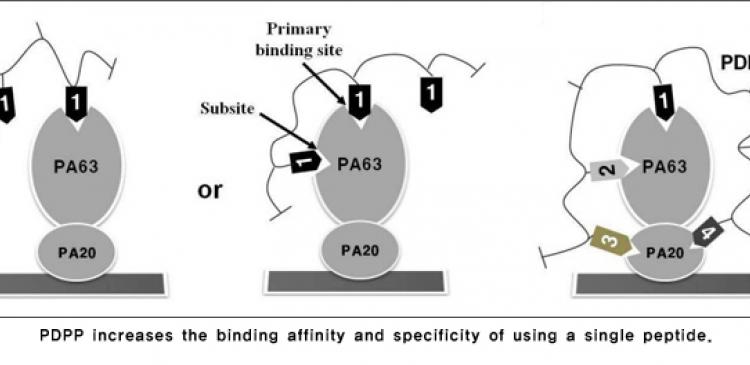Yoon has created PDPP which overcomes the limitations of antibodies
After 9/11, there were several new forms of terrorist attacks. Among them, envelopes with white powder were sent to banks, political, and government buildings within the United States which caused the deaths of five individuals. The white powder was found to be anthrax, a bacteria called bacillus anthracis which causes a serious infectious disease. Inhalation of anthrax spores infects the body through the lungs. Anthrax releases several toxic substances and an infection of the lungs if left untreated is usually fatal.
The most crucial factor in identifying anthrax is to identify the diseases’ protein. This is currently done using antibodies. However, the production of antibodies is costly and the process is complicated. In addition, it is easily affected by environmental factors such as humidity and temperature. This makes it hard to preserve its effectiveness. This is also the reason why pregnancy test kits, which also use antibodies, are vacuum packed.
However, Moon-Young Yoon (Professor, Department of Chemistry) has found an innovative solution called ‘Polyvalent Directed Peptide Polymer (PDPP)’ which overcomes the limitations of antibodies. His research was published in Advanced Materials 23, 5425-5429.
Internet Hanyang News met with Yoon to learn more about his research.
Q: Could you tell us about your research regarding peptides?
A: A peptide is a formation of less than 50 amino acids, a molecule that combines with others to form protein. A peptide’s size is only one-seventieth of that of an antibody. Due to its small size, it is less reactive and much more biochemically stable providing a far more reliable and easier to manufacture alternative to antibodies.
The idea of using peptides was theorized by others. However, up until now no one has figured out how to actually do it. While it is smaller than an antibody, its specificity is less, meaning the capability of one single peptide was limited.
To overcome this limitation, I proposed a solution known as PDPP, a method of combining multiple peptides on a polymer bound to multiply receptors on a target. This increases the binding affinity and specificity of using a single peptide to more than 106. It is the optimal solution for replacing the role of antibodies.
Q: What is the potential of PDPP and how would it affect society?
A: In short, its potentials are limitless. PDPP is not only effective but also less expensive and simpler to produce. This enables commercialization and a wide range of uses for PDPP. Since its role is to detect molecules, PDPP can be used for any types of tool used for detection.
Detecting anthrax is just the original purpose of the research. When PDPP is widely used, diseases such as cancer or diabetes could be found in individuals without the need for costly medical examinations. The degree of environmental pollution by materials such as heavy metals could also be located faster. Its usage could also be applied in areas such as clinical diagnosis, military, agricultural, livestock, industrial, and public welfare.
Q: Are you conducting any research regarding the application of PDPP for commercial usage?
A: The research that I am conducting for commercial usage is medical, environmental, military, agricultural, and livestock. Specifically, for medical usage, I am focusing on finding methods to detect breast cancer, lung cancer, brain cancer, and Alzheimer disease. Research regarding the environment is focused on detecting heavy metal in water and air.
Q. What was the biggest hardship of your research?
A: I started my research after the numerous anthrax attacks following 9/11. During the period, researchers were using antibodies for detection, and the limitations of antibodies were not a major problem. Since my research was unprecedented, it was hard to gain interest and receive funding. As a result, it took us more than 9 years to create PDPP. If funding was not a problem, our research would have taken less than 4 years.
However, during the 9 years of research, I have never felt the desire to quitting. When imagining the possibility of my research and the impact it would bring to society, my passion never had time to rest. This passion and goal has led to the success of my research.
Over the following years, my research has been funded mostly by ‘Bio-green 21 Business’ of the Rural Development Administration and National Research Foundation of Korea.
Q. Do you have any comments for our HYU students?
A. First of all, I would like to state the importance of life science to students majoring in chemistry. It is true that the development of information technology has brought comfort to human society. However, we should also remind ourselves that humanity’s fundamental dream is to live a long life without suffering from diseases. Life science is placed at the center of this dream.
Even if one takes preemptive measures, disease itself comes without notice, and no one is free from it. In this sense, early diagnosis is as important as curing a disease. As the number of medical schools has increased, there are a lot of students who are willing to become doctors. While doctors are needed and are crucial for society, I also believe that becoming a scientist in the field of chemistry or life science is equally important for the development of mankind.
For the students in general, I would like to emphasize the importance of effort and perseverance. People who succeed are those who devote their lives persistently. Especially in science, attempts and failures are constant events that scientists face. Success only comes when one endures their failure and pursues numerous attempts.
If you have a certain goal in life, something which you enjoy and know that you are good at, never give up. People who possess talent in a certain field already accomplish their goals at a young age. However, I do not believe that the majority of those who succeed in life are talented individuals. Most of the people who succeed are those who have the quality of effort and perseverance. This is what I believe HYU students should embrace.
Article written by Jisoo Lee
Photos by Gae-ho Seo




